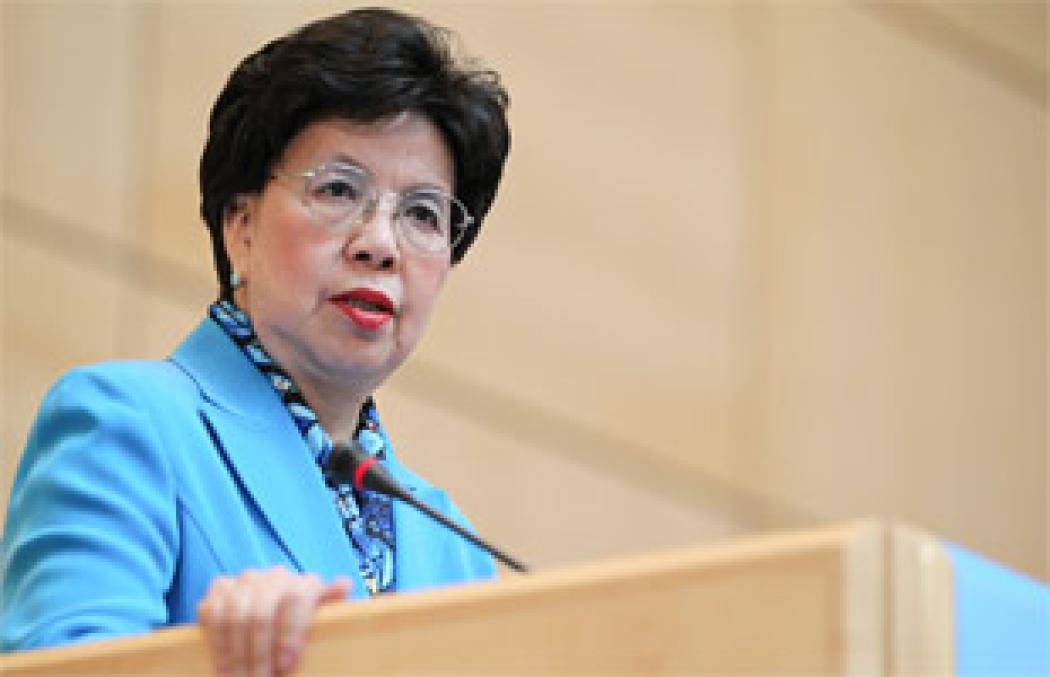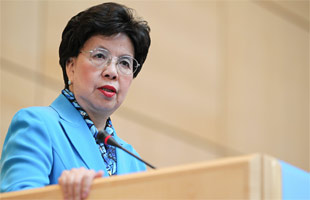How frontline health workers can help achieve universal health coverage

By Jeff Meer, Public Health Institute
Organizations involved in global health have had a lot to focus on during the past several weeks. The month of May saw the 66th session of the World Health Assembly in Geneva, as well as the release of the United Nations High Level Panel’s report on the post-2015 Development Goals. And those interested in health systems strengthening and frontline health workers have had a great incentive to tune in to these events, because both could have profound implications for the future of our work in global health.
 Photo Courtesy World Health Organization (all rights reserved). WHO Executive Director Margaret Chan speaking to the 66th session of the World Health Assembly in Geneva, Switzerland, May 2013.
Photo Courtesy World Health Organization (all rights reserved). WHO Executive Director Margaret Chan speaking to the 66th session of the World Health Assembly in Geneva, Switzerland, May 2013.
The World Health Assembly, which met May 20-27, charged through a packed agenda, including debates on vaccines, disabilities, mental health, neglected tropical diseases, non-communicable diseases, pandemic influenza, polio, blindness, social determinants of health, coronavirus and counterfeit medical products. In speaking to the Assembly on its final day, its president, Dr. Shigeru Omi, said that “one of the key outcomes of this Assembly is the universal health coverage (UHC) that is now recognized as the key concept to underpin the work of global health in many years to come.”
Whether Dr. Omi’s view is correct or not, there is no question that universal health coverage received a great deal of attention by the delegates in Geneva. For example, United States Secretary of Health and Human Services Kathleen Sebelius, who headed the U.S. delegation to the Assembly, acknowledged the importance of universal health coverage, noting that in this country, the Affordable Care Act, now two years old, is “our country’s most significant step towards UHC in nearly 50 years and it will expand coverage to 33 million Americans who have been unable to access health insurance.” She added, “It moves us toward justice and equity.”
This is of vital importance to many in global health. The recognition that a just world is a place where everyone has access to health care implies a significant expansion of coverage to include many who do not now have such access. And community health workers and other frontline health workers seem like an obvious way help us get there. By shifting tasks – especially in prevention and early diagnosis – away from expensive and difficult to arrange care by physicians, universal health coverage that depends to come degree on community health can be a comparative bargain.
Coincidentally, just after the conclusion of the Assembly, the High Level Panel convened by the U.N. secretary general to consider potential post-2015 development goals announced its conclusions. The results of the panel are not binding on governments, but they do suggest a possible way forward once the Millennium Development Goals end in September 2015.
It is no great surprise that “ensuring healthy lives” was one of the panel’s 12 suggested goals. The panel further recommended that nations take steps to end preventable childhood deaths, increase vaccination coverage, decrease maternal mortality, ensure universal sexual and reproductive rights, and reduce the burden of disease from HIV/AIDS, tuberculosis, malaria, neglected tropical diseases and priority non-communicable diseases (NCDs).
In its explanation of this goal, the Panel wrote that “…to achieve these outcomes requires universal access to basic health care.” The report also says that rising health care costs are of concern, particularly in developed countries, but “the benefits of investing in health outweigh the costs. Every $1 spent generates up to $30 through improved health and increased productivity.” Examples given by the report highly efficient investments include immunizations, bed nets and health education.
Still, this might be cold comfort to those nations where dollars are short and needs are great. Left mainly unsaid is how the ambitious goal of “universal access” can actually be achieved, since even these targeted investments will not cover everyone. For some in global health, frontline health workers, including well-trained, compensated and valued community health workers, are essential parts of the equation. There is one mention in the report of the role of skilled birth attendants in preventing maternal mortality, but otherwise it offers little in the way of ideas how to meet this ambitious target.
One data point: According to the ONE Campaign, Rwanda recently achieved the highest ranking among African nations for progress toward achieving the Millennium Development Goals. In speaking about this at a forum on Capitol Hill on June 7, 2013, Dr. Kathy Kantengwa of Medical Sciences for Health (formerly Vice President of the Rwanda Medical Association) said that in post-genocide Rwanda, it would not have been possible to reach this achievement without reliance on community health workers. Will other low- and middle-income nations, including those in fragile states, follow this example?
